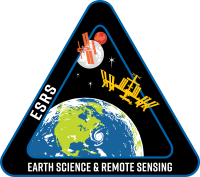Central Tien Shan, China
The Tien Shan—“celestial mountains” in Chinese—is one of the largest continuous mountain ranges in the world, extending approximately 2,500 kilometers (1,550 miles) roughly east-west across Central Asia. This astronaut photograph provides a view of the central Tien Shan, about 64 kilometers (40 miles) east of where the borders of China, Kyrgyzstan, and Kazakhstan meet.
While the image looks like it might have been taken from an airplane, it was taken from the International Space Station (ISS) at an altitude of 341 kilometers (211 miles). The altitude plus the horizontal distance from the site—ISS was approximately 304 kilometers (289 miles) to the southwest—produces an oblique view. This angle, together with shadowing of valleys, accentuates the mountainous topography.
Like the Himalayas to the south, the uplift of the Tien Shan results from the ongoing collision between the Eurasian and Indian tectonic plates. The rugged topography of the range is the result of subsequent erosion by water, wind and, in the highest parts of the range, active glaciers. Two types of glaciers are visible in the image; cirque glaciers occupy amphitheater-like depressions on the upper slopes of the mountains, and feed ice downslope to aggregate into large valley glaciers such as the one at image center. Low clouds obscure an adjacent valley and glaciers to the north (upper left).
Two high peaks of the central Tien Shan are identifiable in the image. Xuelian Feng has a summit of 6, 527 meters (21,414 feet) above sea level. To the east, the aptly-named Peak 6231 has a summit 6,231 meters (20,443 feet) above sea level.
Astronaut photograph ISS027-E-5274 was acquired on March 16, 2011, with a Nikon D2Xs digital camera using an 800 mm lens, and is provided by the ISS Crew Earth Observations experiment and Image Science & Analysis Laboratory, Johnson Space Center. The image was taken by the Expedition 27 crew. The image has been cropped and enhanced to improve contrast. Lens artifacts have been removed. The International Space Station Program supports the laboratory as part of the ISS National Lab to help astronauts take pictures of Earth that will be of the greatest value to scientists and the public, and to make those images freely available on the Internet. Additional images taken by astronauts and cosmonauts can be viewed at the NASA/JSC Gateway to Astronaut Photography of Earth. Caption by William L. Stefanov, NASA-JSC.

